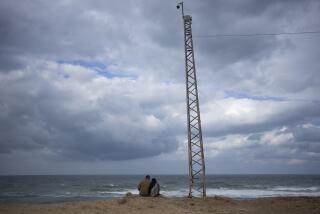U.N. nuclear agency plans to cancel some aid to Iran
- Share via
TEHRAN — The U.N. nuclear agency signaled Friday that it was preparing to cancel technical aid on nearly half its nuclear cooperation projects with Iran, a significant step toward implementing sanctions aimed at halting the nation’s controversial uranium enrichment program.
In a report to the International Atomic Energy Agency’s board of governors in Vienna, the agency leadership recommended stopping all assistance on projects that could contribute to enrichment and reprocessing work prohibited under a sanctions resolution adopted by the U.N. Security Council in December.
The cuts, expected to be approved by the agency’s board of directors in March, end all technical aid for “safe and reliable nuclear power generation,” for strategic planning and for a nuclear technology center under development. But they leave intact assistance for medicine development, radioactive waste disposal, wastewater treatment and agriculture.
They do not affect the agency’s assistance on preparation to operate the civilian nuclear power reactor under construction at Bushehr, which is exempted from the U.N. resolution.
“No technical assistance ... can be provided to Iran that relates to the proliferation-sensitive nuclear activities specified in the resolution. Technical assistance, however, can be provided to Iran when, after a case-by-case screening, it is found to be in conformity with the provisions of the resolution,” says the report, prepared by IAEA chief Mohamed ElBaradei.
In Vienna, Iran’s ambassador to the IAEA, Ali Asghar Soltanieh, was critical of the agency’s decision.
“Our cooperation with the IAEA was in agriculture, medicine and peaceful affairs. So why was this halt imposed to our peaceful cooperation as well?” he told the Islamic Republic News Agency. He said the “technical and legal paradox” in the Security Council resolution “has prompted the IAEA to take this decision.”
In all, the agency proposes to withdraw cooperation on as many as four of 15 national projects and as many as 14 of 34 regional projects, though a small number of those set for cancellation may be permitted after a case-by-case review.
Analysts said the IAEA action would probably not have a significant effect on Iran’s nuclear program but would be likely to be perceived as a blow nonetheless. Iran is one of the largest recipients of U.N. nuclear technical cooperation.
“Iran will complain and say none of these projects are for enrichment or reprocessing, the sensitive technologies that were singled out in the resolution. But the agency is being careful to follow the letter of the Security Council resolution,” said Mark Fitzpatrick, a nuclear specialist with the International Institute of Strategic Studies in London.
He said Iran, apparently caught by surprise by the Security Council’s unanimous vote in favor of the sanctions resolution in December, has subsequently sought to downplay the measure’s potential impact.
“They’ve been saying it wouldn’t amount to anything. Well, here we have an indication that the IAEA says it does amount to something. Here’s some projects that have to be stopped,” he said. “It will contribute to the psychological discomfort of Iran.”
David Albright, a former nuclear inspector who is president of the Washington-based Institute for Science and International Security, said the action “will certainly irritate” Iran, in part because Tehran may not have the funds to proceed with all the projects without U.N. help.
Shortly after the report’s release, official Iranian sources said chief nuclear negotiator Ali Larijani had fallen ill and would not attend a security conference this weekend when informal talks on a negotiated solution to the standoff were planned.
But Iranian television later said Larijani would attend the meeting.
U.S. Defense Secretary Robert M. Gates is also scheduled to attend, but conference organizers said a direct meeting between the two men was unlikely.
Iran, which insists its nuclear program is intended to develop nuclear energy, not weapons, is hoping to avoid a second, escalated round of sanctions, and analysts here say it might look favorably on ElBaradei’s proposal for a three-month “time out” on uranium enrichment in exchange for a similar suspension of sanctions.
Iranian President Mahmoud Ahmadinejad is supposed to make an announcement on the nuclear program during Sunday’s planned street demonstrations in celebration of the anniversary of the 1979 Islamic Revolution. Many analysts believe he will announce some progress in setting up the first of 3,000 enrichment centrifuges Iran has said it is building at a major new underground facility in Natanz.
Once that milestone has been reached, there are signs some in Iran might advocate putting the centrifuge program on hold for a time. Abbas Maleki, a former deputy foreign minister, said the centrifuges could be placed on “warm standby,” injected with warm air rather than uranium gas, until a decision was reached to use them for generating fuel.
“This would present a very strange case for the United States,” he said in an interview. “The United States would then be in a corner. Because all of the maps and strategies in Washington have been designed for a defiant Iran. Not an Iran which is cooperating with the United Nations.”
At the same time, he cautioned, Iran is still not prepared to make unilateral concessions.
“There are thousands of cameras watching what is going on with the nuclear program, and Iran is accepting,” he said. “But at the same time, Iran wants to reach a face-saving solution. You cannot say to a government that they must say, ‘I’m sorry, you are right.’ Iran is not Libya.”
More to Read
Sign up for Essential California
The most important California stories and recommendations in your inbox every morning.
You may occasionally receive promotional content from the Los Angeles Times.










